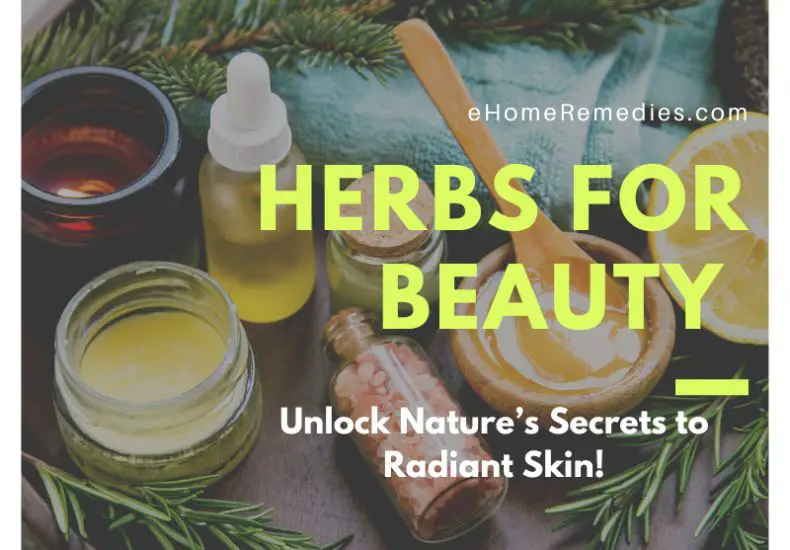
Herbs for Beauty: Unlock Nature’s Secrets to Radiant Skin!
Key Takeaways
- Aloe vera, rose, chamomile, calendula, lavender, and rosemary are all herbs that can soothe, moisturize, balance, and promote a clear complexion.
- Herbs offer potent healing and anti-aging properties for skin and hair care
- Herbal treatments provide a more holistic and eco-friendly approach to beauty
- Incorporating herbs into your routine can enhance overall well-being while maintaining a radiant appearance
Herbs have been used for centuries to promote beauty and enhance overall well-being. Today, many people are turning to these natural remedies to support their beauty routine, seeking healthier and more sustainable options for their hair and skin. From deeply nourishing and moisturizing properties to providing vital nutrients for growth and repair, herbs can play a crucial role in maintaining a radiant and youthful appearance.
By incorporating herbs into your beauty routine, you’re not only tapping into the potent healing and anti-aging properties of these plants but also embracing a more holistic and eco-friendly approach to self-care. From herbal hair treatments to natural skincare solutions, herbs offer countless benefits that can help you look and feel your absolute best, regardless of age or individual concerns.
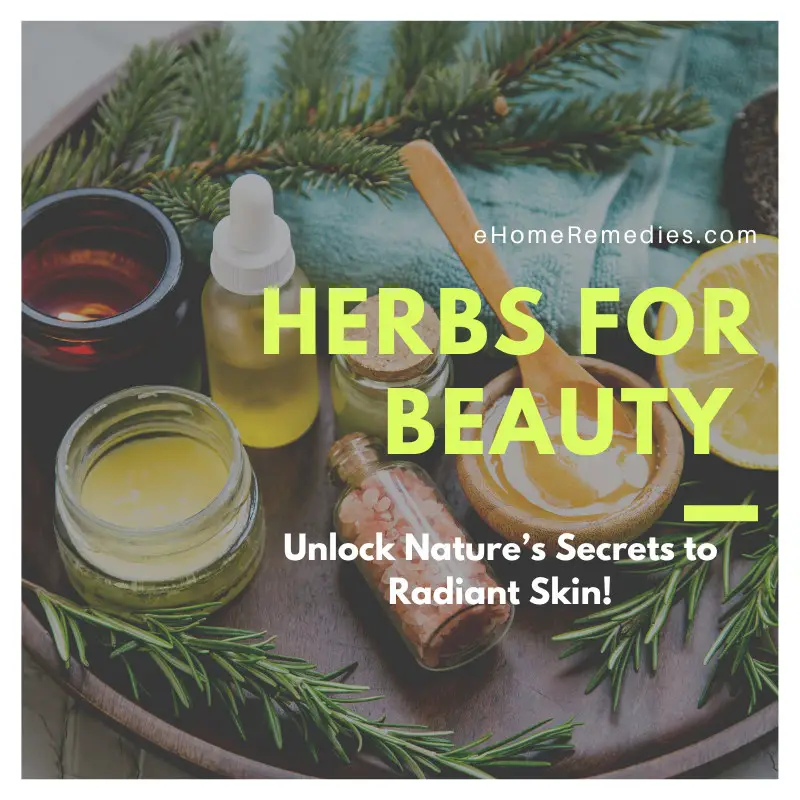
Herbs for a Healthy and Beautiful Life
Aloe Vera
Aloe vera is a must-have plant for your skincare garden! Not only is it easy to grow, but it’s also highly versatile. With its anti-inflammatory properties, aloe vera soothes and moisturizes your skin, providing relief from various skin issues.
Rose
Roses offer much more than a lovely fragrance. With their essential oils, they can improve your skin’s overall health and beauty. Roses are known for their balancing properties, helping maintain skin’s natural hydration levels. Try adding rose-infused water or oil to your skincare routine for a fresh, radiant complexion.
Chamomile
Searching for a calming and gentle herb? Chamomile is your answer! This delicate flower serves as a relaxing anti-inflammatory agent that can reduce redness and soothe irritated skin. Create a chamomile tea facial steam or add its essential oil to your beauty recipes for a calming experience.
Calendula
Calendula is a beautiful herb that does wonders for your skin. Its versatile nature allows it to help address common skin conditions like bruises, cuts, scars, and sores, thanks to its antifungal and antibacterial properties. Calendula is suitable for all skin types, even the most sensitive ones.
Lavender
Indulge in the relaxing scent of lavender that not only calms your senses but also benefits your skin. Lavender is known for its anti-inflammatory and antiseptic properties, making it perfect for soothing skin conditions like acne or minor burns. Use lavender essential oil or fresh lavender flowers for that touch of serenity.
Rosemary
Get acquainted with rosemary, a versatile herb that can significantly impact your skin’s health and beauty. With its antibacterial properties, rosemary is commonly used in skincare to promote a clear complexion. Incorporate this herb in homemade beauty recipes or infuse it into essential oils for a fresh, invigorating experience.
Chart: Herbs & Their Skin Benefits
| Herb | Skin Benefits |
|---|---|
| Aloe Vera | Soothes, moisturizes, reduces redness |
| Rose | Balances, hydrates, nourishes |
| Chamomile | Calming, anti-inflammatory |
| Calendula | Heals, antibacterial, antifungal |
| Lavender | Relaxes, anti-inflammatory, antiseptic |
| Rosemary | Antibacterial, promotes clear skin |
Remember, each herb provides its unique benefits, so don’t be afraid to mix and match or try new recipes to find what works best for your skin. Embrace the beauty of nature and enjoy a healthy, radiant life!
Herbs for Skin Care
Herbal skincare is a popular and natural approach to caring for your skin. By incorporating herbs, you can nourish, heal, and protect your skin without resorting to chemicals or expensive treatments.
Skincare for Different Skin Types
Each skin type requires a unique set of herbs to address its needs. Here are some suggestions for various skin types:
- Sensitive skin: Opt for herbs like chamomile and calendula, which can soothe irritation and redness.
- Dry skin: Look for herbs rich in natural oils and moisturizing properties, such as lavender and rose.
- Oily skin: Consider herbs with astringent qualities like lemon balm and witch hazel to help balance sebum production.
Herbs for Acne and Blemishes
Herbal remedies can provide relief for acne-prone and blemished skin. Some herbs to consider include:
- Thyme: With its antiseptic properties, thyme is ideal for treating acne and controlling bacteria that cause breakouts.
- Turmeric: Acting as an anti-inflammatory, turmeric reduces redness and swelling associated with acne and blemishes.
- Tea tree oil: Known for its antibacterial and anti-inflammatory properties, tea tree oil can help reduce acne and even prevent scar formation.
Facial Masks with Herbs
Face masks infused with herbs can provide a relaxing and therapeutic skincare experience. Here are a few ideas:
- Soothing mask: Combine chamomile, lavender, and honey for a calming mask that nourishes and hydrates irritated skin.
- Exfoliating mask: Mix oatmeal, ground almonds, and rose petals for a gently exfoliating and rejuvenating mask that leaves your skin glowing.
Remember to always patch test new ingredients on a small area of your skin before diving into a full application, and enjoy the benefits of these natural, herbal skincare solutions!
Healing and Anti-Aging Properties
Antioxidants and Vitamins
Are you tired of the signs of aging on your skin? Cheer up, because nature has gifted us some fantastic herbs and ingredients that help in healing and rejuvenating your skin! Many natural ingredients are rich in antioxidants and vitamins that help improve skin health and slow down the aging process. For instance, argan oil is native to Morocco and is packed with vitamin A, vitamin E, and various antioxidants, making it ideal for anti-aging. You can also find vitamin C in many serums and lotions, which contributes to collagen production, reducing wrinkles, and giving your skin a youthful glow.
- Argan oil: vitamin A, vitamin E, and antioxidants
- Vitamin C: promotes collagen production and reduces wrinkles
Anti-Inflammatory Herbs
Nobody likes inflamed and irritated skin, right? Thankfully, nature has provided us with some fantastic anti-inflammatory herbs that can calm your skin and reduce redness. Turmeric is a magical spice with incredible anti-inflammatory properties, while thyme can reduce the appearance of fine lines and wrinkles. These herbs and spices are perfect additions to your skincare routine, providing a soothing and natural solution for irritated skin.
- Turmeric: anti-inflammatory properties help calm skin and reduce redness
- Thyme: reduces the appearance of fine lines and wrinkles
Soothing Effects
Tired of dealing with inflamed or irritated skin? You’re in luck! Many herbs, such as chamomile, can help soothe acne, redness, and signs of aging by providing a calming effect on your skin. Furthermore, aloe vera is a popular ingredient in serums, lotions, and gels that helps treat skin injuries and provide a soothing sensation. Incorporate these healing herbs into your skincare routine for a more comforting and calming experience.
- Chamomile: soothes acne, redness, and signs of aging
- Aloe vera: helps treat skin injuries and provides a calming effect on the skin
Give these natural ingredients and herbs a try, and watch as they work their magic, making your skin healthy, vibrant, and youthful!
Herbal Hair Care
Herbal hair care has been utilized for centuries to promote hair growth, strength, and overall scalp health. Implementing these natural remedies into your hair care routine can truly enhance your hair’s appearance and health! In this section, we will cover herbs for hair growth and strength, as well as natural conditioners and treatments.
Herbs for Hair Growth and Strength
There are numerous herbs that can stimulate hair growth and improve the strength of your strands. Here are a few notable herbs to consider:
- Gotu Kola: This herb helps stimulate blood circulation and is known to boost hair growth in addition to repairing damaged hair (source).
- Nettle: Rich in vitamins and minerals, nettle nourishes the hair and promotes growth while also combating dandruff (source).
- Aloe Vera: A popular remedy for healthy skin, aloe vera also promotes hair growth and balances the scalp’s pH levels while conditioning your strands (source).
Consider incorporating these herbs into your hair care routine to promote growth and strength.
Natural Conditioners and Treatments
Aside from herbs, there are other natural remedies that can help improve the shine and overall health of your hair. Below are three DIY treatments you can try:
- Coconut Oil: Applying coconut oil to your hair can provide deep conditioning and nourishment. It’s also excellent at combating dandruff and promoting healthy scalp circulation.
- Egg Mask: Mix an egg with a tablespoon of olive oil for a protein-packed hair mask. This treatment helps restore damaged hair, making it soft, smooth, and manageable.
- Avocado: Rich in healthy fats and essential nutrients, an avocado hair mask can provide intense hydration and improve hair’s elasticity, combating fine lines and breakage.
Experiment with these natural hair conditioners and treatments to discover what works best for you and your tresses. Remember, herbal hair care is not only great for your precious locks but also for maintaining a healthy scalp and reducing dandruff. So, give these remedies a try and enjoy the benefits they bring to your hair, skin, and nails!
Herbal Skincare Products
Creams and Lotions
Are you looking for natural ways to nourish and moisturize your skin? Herbal creams and lotions might be your answer. These products are formulated with beneficial herbs, essential oils, and antioxidants which contribute to healthier skin. Look for creams and lotions with ingredients like:
- Calendula: Soothes and calms sensitive skin
- Aloe vera: Provides hydration and reduces inflammation
- Chamomile: Relieves irritation and redness
Cleansers and Toners
Keeping your skin clean is essential, and incorporating herbal cleansers and toners into your skincare routine can be particularly beneficial. These products often contain natural ingredients that not only cleanse but also gently exfoliate your skin. Some popular cleansers and toners to try include:
- Beekman 1802 Milk Wash Exfoliating Jelly Cleanser: A milk cleanser that revitalizes your skin
- Versed Gentle Cycle Milky Cleanser: A budget-friendly option for everyday use
- Ursa Major Fantastic Face Wash: A cleanser that helps maintain your skin’s pH balance
Face Masks and Salves
In need of some extra pampering for your skin? Herbal face masks and salves could be your go-to options. These products offer deeper treatments, helping to address specific skin concerns like dryness, acne, or dullness. Here are a few popular options to consider:
- Clay-based masks: Infused with herbs like neem or lavender that help purify and brighten your skin
- Hydrating masks: Featuring herbal ingredients such as rose, cucumber, or honey to provide intensive hydration
- Salves and balms: Formulated with soothing herbs like arnica, St. John’s wort or comfrey to heal irritated or damaged skin
So, don’t hesitate to explore the world of herbal skincare products! By incorporating these natural, nourishing ingredients into your skincare routine, you’ll be on your way to achieving that healthy, radiant glow you’ve always wanted.
DIY Herbal Skincare Series
Herb-Infused Oils
Herb-infused oils are a fantastic way to reap the skin-healing benefits of various plants! Creating your own is easy and fun. Simply combine the desired botanical extracts, such as calendula, mint, or comfrey, with a carrier oil, like coconut or almond oil. Let the mixture steep for a few weeks before straining and using it as a base for balms, creams, or even directly on your skin.
Herbal Rinses
Add a refreshing boost to your skincare routine with herbal rinses. These gentle, water-based infusions can feature aloe vera gel, mint, or other skin healing plants. To make a rinse:
- Boil water, then add a handful of fresh or dried herbs.
- Allow the mixture to steep, then strain it.
- Apply the rinse to your skin and enjoy its soothing, clarifying effects!
Customizable Balms and Creams
Finally, level up your skincare with DIY balms and creams. Garnish these luscious mixtures with natural ingredients like herbal skincare extracts and your choice of soothing oils.
Start by melting a base of beeswax or cocoa butter in a double boiler. Mix in your favorite herb-infused oil to enrich the balm with skin healing plants. Complete your creation by adding a few drops of essential oil for a fragrant touch! Pour the mixture into a container, let it cool, and enjoy personalized skincare bliss.
By incorporating these DIY techniques into your skincare regimen, you can harness the power of natural, plant-based remedies for radiant, healthy skin. Remember to experiment with different herbs and botanicals to refine your skincare recipes and discover which combinations work best for you. Happy crafting!
Herbs for Common Skin Issues
Fungal Infections and Eczema Treatment
Have you ever experienced fungal infections or eczema? You’re in luck, as there are natural remedies to help treat these common skin issues. One fantastic option is basil. This amazing herb has strong antibacterial properties and can aid in dealing with fungal infections. For eczema treatment, you can also benefit from almond oil, which is well-known for its moisturizing and nourishing effects on the skin.
Here are some key benefits of these remedies:
- Basil: antibacterial, antifungal, and soothing for the skin
- Almond oil: moisturizing, nourishing, and gentle on sensitive skin
Antibacterial and Antiseptic Herbs
Now that you’re aware of some herbal treatments for fungal infections and eczema, let’s move on to antibacterial and antiseptic herbs. Two incredibly useful plant extracts for these purposes are tea tree oil and calendula. Tea tree oil is a potent antiseptic and antibacterial agent, perfect for treating cuts, wounds, and infections. Meanwhile, calendula is praised for its anti-inflammatory and antimicrobial properties, making it an excellent choice for treating various skin issues.
To summarize, here are the main benefits of these herbs:
- Tea tree oil: strong antiseptic and antibacterial qualities
- Calendula: anti-inflammatory, antimicrobial, and skin-soothing effects
With these herbs and plant extracts, you are now equipped to address and treat some common skin issues naturally and effectively. Give them a try and experience the power of nature!
Herbs for a Balanced Beauty Regime
Incorporating herbs into your beauty routine can do wonders for your skin and overall well-being. Let’s explore how to use herbs for stress relief, energy and vitality, and inner and outer beauty.
Stress Relief with Herbs
Stress can take a toll on your skin, but certain herbs can help you relax and improve your complexion. Try incorporating these herbs into your beauty regime:
- Lavender: Known for its calming effects, adding lavender essential oil to your bath or diffusing it in your room can promote relaxation and better sleep.
- Chamomile: Drinking chamomile tea or applying chamomile-infused skincare products can soothe sensitive skin and ease stress-related breakouts.
Energy and Vitality
Boost your energy and vitality with these invigorating herbs:
- Ginseng: Often found in skincare products, ginseng root can improve your skin’s elasticity while increasing your energy levels.
- Rosemary: Rich in antioxidants, rosemary essential oil can be applied topically or inhaled to stimulate blood circulation and improve energy.
Herbs for Inner and Outer Beauty
Achieve a radiant glow by incorporating these herbs into your beauty routine:
- Aloe Vera: Known for its soothing and moisturizing properties, aloe vera can be applied topically to treat various skin concerns for both normal-to-dry and oily skin types.
- Calendula: With healing and anti-inflammatory benefits, calendula (marigold) can be infused into oils or skincare products to improve skin texture.
- Turmeric: This powerful anti-inflammatory and antioxidant herb can be added to DIY face masks for a brighter, more glowing complexion.
In summary, incorporating these herbs into your daily life can lead to a more balanced beauty regime, leaving you feeling great both inside and out. Now it’s time to give these herbs a try and embrace your natural beauty.
Incorporating Herbs into Beauty Products
Skincare Herbs in the Garden
Growing your own garden with skincare herbs can be a fantastic way to enjoy the numerous benefits they offer. Some of the popular herbs used for beauty purposes include rose petals, witch hazel, echinacea, and lemon balm. You can also grow plantain and yarrow for their skin-soothing properties. Adding these herbs to your garden not only boosts its beauty but also allows you to use them in homemade skincare products.
Herbal Beauty Recipes
Once you’ve grown your skincare herbs, it’s time to incorporate them into beauty products. Here are a few ideas to get you started:
- Rose Petal Toner: Soak fresh or dried rose petals in witch hazel for a soothing and refreshing toner. This fragrant mixture can help balance and tone your skin.
- Echinacea Face Cream: Make an echinacea-infused oil by gently heating the plant in a carrier oil, such as grapeseed oil. Cool and strain the mixture. Now, combine the infused oil with other nourishing oils, butters, and natural emulsifiers. This face cream can help with inflammation and healing the skin.
- Lemon Balm Lip Balm: Melt beeswax, shea butter, and coconut oil in a double boiler. Add lemon balm-infused oil and a few drops of lemon essential oil. Pour the mixture into lip balm tubes or tins to solidify. You’ve now created a nourishing and delightful lip balm!
Incorporating these recipes into your beauty routine can transform your garden-grown herbs into effective and natural skincare products! Enjoy the benefits and satisfaction of using ingredients you’ve cultivated yourself. Happy gardening, and happy pampering!
Frequently Asked Questions
What are the top herbs for youthful skin?
Aloe vera, known for its excellent collagen and elastin-boosting properties, is a top herb for maintaining youthful skin. Its vitamins and minerals nourish the skin, enhancing its elasticity and preventing wrinkles.
Which herbs promote a radiant complexion?
To achieve a radiant complexion, consider using:
- Raw milk in combination with grated coconut and honey, as found in this flawless skin recipe.
- Aloe vera, which also helps in maintaining a youthful and glowing complexion.
What are the best plants for natural skin care?
Some of the best plants for natural skin care include:
- Aloe vera: as mentioned earlier, it helps maintain youthful and radiant skin.
- LINNÉ Repair Face Oil: a multitasking serum made from botanical ingredients that nourish and repair the skin.
Which botanical ingredients boost skin’s glow?
Botanical ingredients like:
- Aloe vera: not only maintains youthful skin but also gives it a healthy glow.
- Fleur & Bee’s Nectar of the C: a vitamin C serum that brightens and revitalizes the skin.
What herbs improve skin texture and appearance?
Herbs that positively impact skin texture and appearance include:
- Aloe vera: already mentioned for its multiple benefits for the skin.
- Raw Elements’ Certified Natural Sunscreen SPF 30: a sustainable sunscreen that protects and enhances the overall skin appearance.
Which herbs are effective for skin hydration?
Effective herbs for skin hydration include:
- Aloe vera: its nourishing properties help keep the skin hydrated and soft.
- Coconut: found in this raw milk and coconut face pack recipe, it works alongside honey and raw milk for deep moisturization and skin hydration.
Aloe vera, known for its excellent collagen and elastin-boosting properties, is a top herb for maintaining youthful skin. Its vitamins and minerals nourish the skin, enhancing its elasticity and preventing wrinkles.
"}},{"@type":"Question","name":"Which herbs promote a radiant complexion?","acceptedAnswer":{"@type":"Answer","text":"
To achieve a radiant complexion, consider using:
\n
- \n
- Raw milk in combination with grated coconut and honey, as found in this flawless skin recipe.
- Aloe vera, which also helps in maintaining a youthful and glowing complexion.
\n
\n
"}},{"@type":"Question","name":"What are the best plants for natural skin care?","acceptedAnswer":{"@type":"Answer","text":"
Some of the best plants for natural skin care include:
\n
- \n
- Aloe vera: as mentioned earlier, it helps maintain youthful and radiant skin.
- LINNÉ Repair Face Oil: a multitasking serum made from botanical ingredients that nourish and repair the skin.
\n
\n
"}},{"@type":"Question","name":"Which botanical ingredients boost skin's glow?","acceptedAnswer":{"@type":"Answer","text":"
Botanical ingredients like:
\n
- \n
- Aloe vera: not only maintains youthful skin but also gives it a healthy glow.
- Fleur & Bee's Nectar of the C: a vitamin C serum that brightens and revitalizes the skin.
\n
\n
"}},{"@type":"Question","name":"What herbs improve skin texture and appearance?","acceptedAnswer":{"@type":"Answer","text":"
Herbs that positively impact skin texture and appearance include:
\n
- \n
- Aloe vera: already mentioned for its multiple benefits for the skin.
- Raw Elements' Certified Natural Sunscreen SPF 30: a sustainable sunscreen that protects and enhances the overall skin appearance.
\n
\n
"}},{"@type":"Question","name":"Which herbs are effective for skin hydration?","acceptedAnswer":{"@type":"Answer","text":"
Effective herbs for skin hydration include:
\n
- \n
- Aloe vera: its nourishing properties help keep the skin hydrated and soft.
- Coconut: found in this raw milk and coconut face pack recipe, it works alongside honey and raw milk for deep moisturization and skin hydration.
\n
\n
"}}]}
You may also like
Calendar
| M | T | W | T | F | S | S |
|---|---|---|---|---|---|---|
| 1 | 2 | |||||
| 3 | 4 | 5 | 6 | 7 | 8 | 9 |
| 10 | 11 | 12 | 13 | 14 | 15 | 16 |
| 17 | 18 | 19 | 20 | 21 | 22 | 23 |
| 24 | 25 | 26 | 27 | 28 | 29 | 30 |

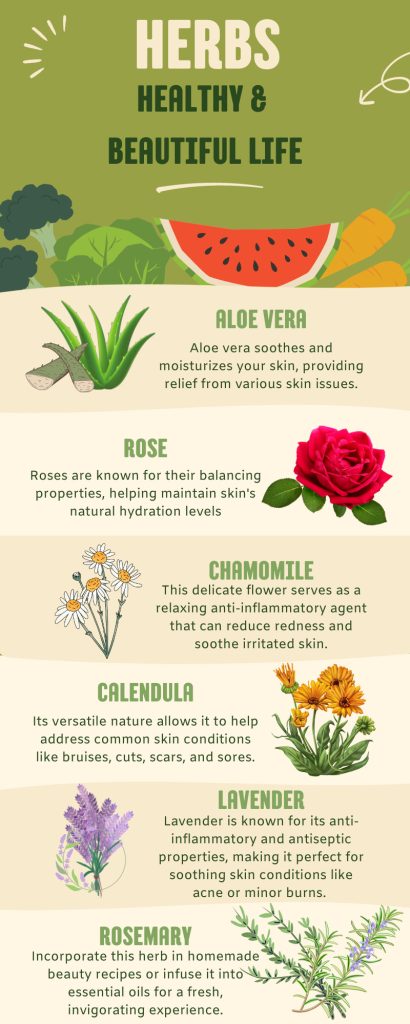
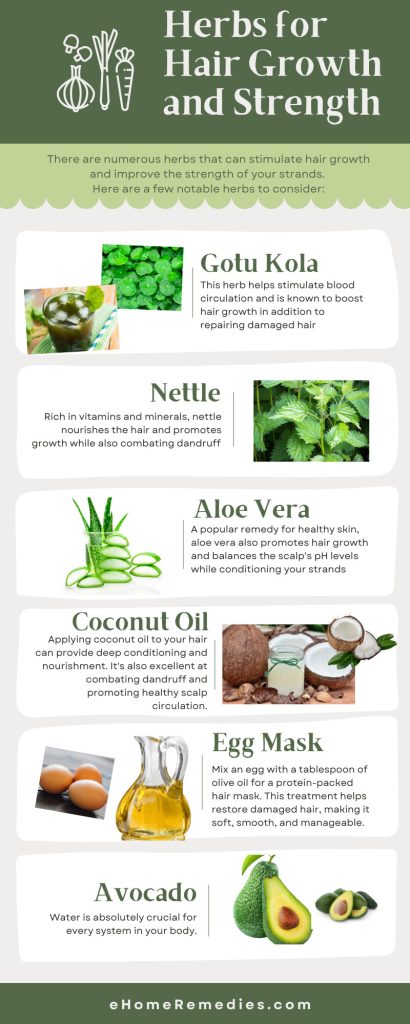
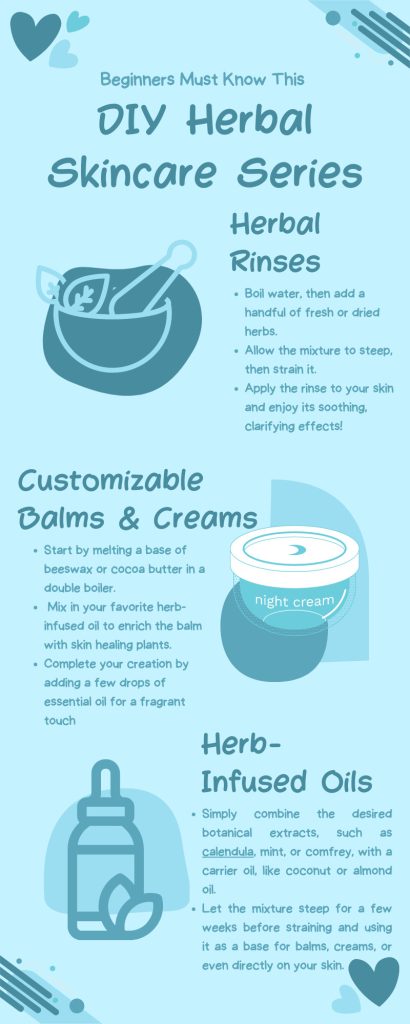
Leave a Reply